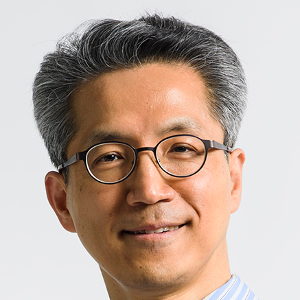Education
B.S., Seoul National University, Seoul, Korea, Aerospace Engineering, 1992
M.S., Korea Advanced Institute of Science and Technology (KAIST), Taejon, Korea, Aerospace Engineering, 1994
PhD, Stanford University, Aeronautics and Astronautics, 2004
Prior Appointments
Post-doctoral Associate, Dept. of Aeronautics and Astronautics, Stanford University, 2004
Notable Awards
NSF CAREER AWARD, 2008
Selected into the nation's brightest young engineers by the National Academy of Engineering (NAE) who were invited to attend the 2008 Frontiers of Engineering Symposium, 2008.
AIAA Special Service Citation, 2010
AIAA Associate Fellow, 2012
Biography
Dr. Hwang is a Professor in the School of Aeronautics and Astronautics at Purdue University. He is a member of Purdue's Signature Area for System-of-Systems research. He earned his Ph.D. degree, specialized in the area of multiple-vehicle control and its application to air traffic control using hybrid systems approach, in the Department of Aeronautics and Astronautics at Stanford University. He was a member of the Hybrid Systems Laboratory at Stanford University. He was a full time instructor in the Department of Aerospace Engineering at Korea Air Force Academy from 1994 to 1997. He is an Associate Fellow of the American Institute of Aeronautics and Astronautics (AIAA) and is a member of the Institute of Electrical and Electronics (IEEE) Control Systems Society and Aerospace & Electronic Systems Society. He is currently an associate editor of the IEEE Transactions on Aerospace and Electronic Systems and Asian Journal of Control, an editorial board member of the International Journal of Aeronautical and Space Sciences (IJASS) and a conference editorial board member of IEEE Control Systems Society.
Dr. Hwang's research has been strongly motivated by difficult and interesting practical problems such as controlling multiple-vehicle systems. Controlling multiple-vehicle systems is one of the most important and challenging aspects of modern system theory and practice. Control of such
systems involves the analysis of multiple dynamical systems which have inherently decentralized structures. The motions of vehicles have to be
coordinated in such a way that the vehicles achieve their goals without conflicts between them. This requires path planning (computing optimal
trajectories of vehicles from starting positions to destinations) and conflict detection and resolution. Path planning and conflict detection and
resolution require information about individual vehicles, and therefore communication between vehicles for sharing this information is important. Multiple-vehicle systems encompass a variety of applications, including groups of Unmanned Aerial Vehicles (UAVs), Satellites, and mobile robots; ad-hoc sensor networks; air traffic control.
Dr. Hwang is a head of the Flight Dynamics and Control/Hybrid Systems Laboratory.
